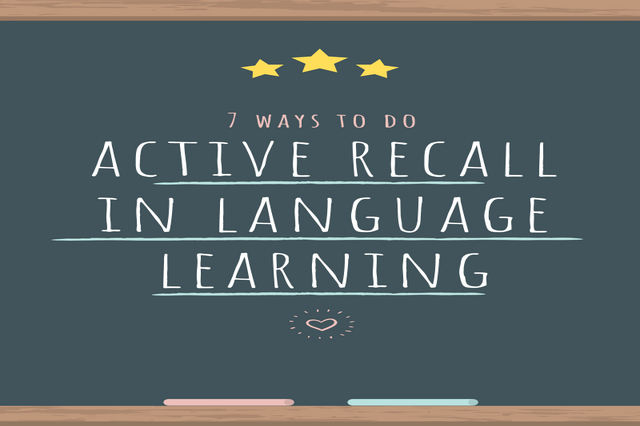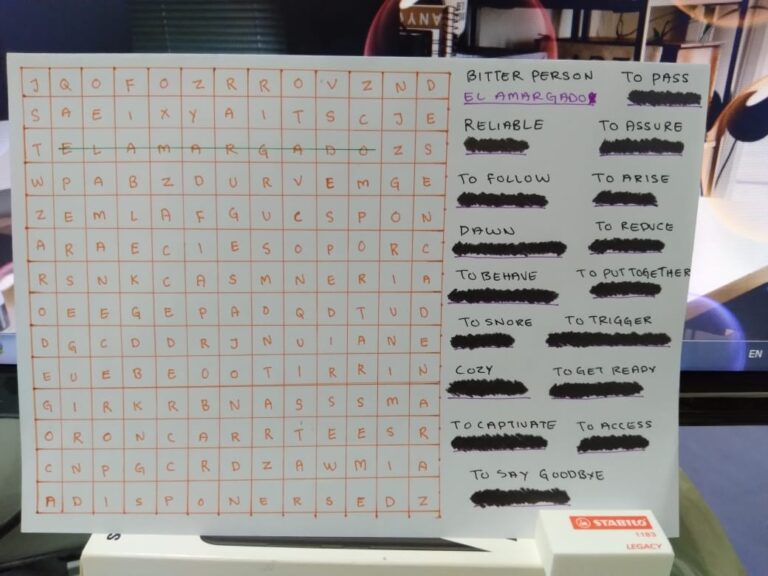
I was listening to a podcast episode about active recall a few weeks ago. After that, I felt like someone splashed water on my face because it turns out I’ve been doing it for years but didn’t realize it.
I didn’t take advantage of it and tried to at least explore the many options.
When brainstorming for this post, I had many ideas but narrowed it down to 7. Before we begin with the list of ways to do active recall in language learning we’ll start with the definition first.
Active recall means forcing your brain to retrieve what you’ve just learned instead of passively reviewing.
The post lists 7 practical methods:
Why it matters: These strategies help you remember better and build stronger, more permanent memory.
It’s the process where you force yourself to remember the last thing you’ve learned or the lessons you’ve learned thus far.
For example, yesterday you were learning about conditional tense, its rules, and whatnot. This morning before you move on to a new topic you try to recall the conditional rules. That’s active recall. Here’s what active recall isn’t.

The first time I came across this in language learning was when I reviewed SpanishDict. I was doing the Ser and Estar topic. The acronym being made out of it is DOCTOR versus PLACE. Starting from that onwards I try to make my own.
For example, when a native Spanish speaker taught me about subjunctives, I came up with ODENQ and STOP GASPED based on the verbs that trigger the use of subjunctives. Now, it’s a bit easier to remember certain grammar rules.
It does work with others too. When revising for tests and exams I used to memorize the bullet points by their first alphabet. I didn’t even bother rearranging them. At that time, I wasn’t aware of this so-called acronym.
I’m sure most of you are familiar with the concept because many popular language apps have been incorporating this for years. It’s been around for a reason.
Rather than using the common ones where you see the English word on one side and the other is the target language, I’d recommend making unique flashcards. For example
Fill in the blank. As you all know, learning in context is much better than learning just words alone. You get to know and see how the verbs are conjugated or used. Clozemaster does a good job on this.
People say writing strengthens your understanding. I don’t like writing down anything when it comes to learning a language but I was willing to try it. Whenever I learn new words, I write sentences with them, usually of something personal.
When I do active recall this way, even if I don’t remember the words at first, it’s those sentences that helped me. Of course, it’s not always a success but hey, it works!
Always do this at the end of every lesson. Ask lots of questions.
In the case of grammar topics, write your answers in your own words. Once you’re done refer back to the lessons and compare. Inevitably, there’s always going to be something missing. Find that missing point and focus on it.
Ask yourself again why they are difficult to remember. There has to be a reason.
Sometimes we know the answers and maybe even the solution, but deep down we know it will be super difficult and requires hard work, so we drop it and find an easier alternative.
Sooner or later, we’re going back to square one. Just because we want to avoid spending time fixing the problems with the real possible solution, we end up wasting precious time with useless ones instead. It happens to me a lot.
It doesn’t have to be difficult. Create easy games such as puzzle games, block games, jar games, etc. Let’s take the jar game as an example. Write down those you struggle with (vocabulary, grammar rules, etc) on a piece of paper together with their answers.
Prepare 4 jars and name them however you want.
Play the game as many and as frequently as you want. Let’s say you pick one and the question could be ‘Write 5 trigger words for preterite tense’.
Once you finish writing find the answer in the answer jar and see if you got it right. If yes, put them in the passed jar. If not, put on the opposite.
In the case where you only got half right, you can get a fifth jar and put it there. Or if you’re lazy you can just put it in the failed jar. If this is too much work perhaps you can try the puzzle.

Create the questions either on the right side or at the bottom. For example, you should use this with ser and not estar because it’s an exception (answer: event/ party).
You can have the answers written in advance but make them invisible by coloring them with a pencil. Just get your eraser ready in case you feel frustrated.
Be creative and have fun.
I always did this throughout my life as a student but never once crossed my mind to use it in language learning. Think of it as a way to wake up those words that have been dormant for so long.
Want to know if you’ve improved from beginner to intermediate or intermediate to advanced? Do this.
Some websites offer online tests or quizzes but if you prefer to do it with your own questions, why not?
Find a specific podcast where it asks you questions and you answer them. The one I use is Language Transfer. Whenever the question is being asked, I pause and answer it myself before resuming again to know the real answer.
Yes, it’s tiring having to do so multiple times but worth it. This is like having verbal questions and answers.
So, have you heard of the term active recall? I’d love to know your own ways of doing it.
©2025 Together We Learn More
©2025 Together We Learn More
Diamy's says:
Thanks for tips. It’s very Useful.
Meina says:
You’re welcome. Thanks for dropping by!